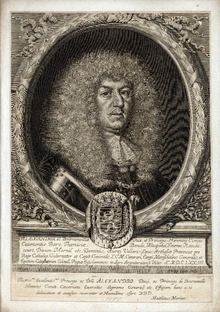|
Alexander von Bournonville
 Alexander von Bournonville, Alexander de Bournonville, Alexander II Hyppolite, Prince of Bournonville and third Count of Hénin-Liétard (Brussels, 5 January 1616 – Pamplona, 20 August 1690) was a Flemish military commander.[1] He held the titles of Field Marshal of the Holy Roman Empire, Knight of the Order of the Golden Fleece, Viceroy of Catalonia (1678–1685) and Viceroy of Navarre (1686–1691).[2] He was the son of Alexander I de Bournonville, count of Henin, Order of the Golden Fleece (1585–1656) and Anne de Melun (1590–1666). He fought for the Holy Roman Empire in the Thirty Years' War and then for Spain in the Franco-Spanish War (1635–1659), where he distinguished himself in the Battle of Arras (1654) and the Battle of Valenciennes (1656). In 1672, he fought as Imperial Field marshal in the Franco-Dutch War and was unable to defeat Vicomte de Turenne in the Battle of Entzheim, despite the Holy Roman Empire's numerical superiority. In 1676 he entered again in Spanish service and was sent the next year to Messina to crush there the rebellion supported by France. See also
References
External links |